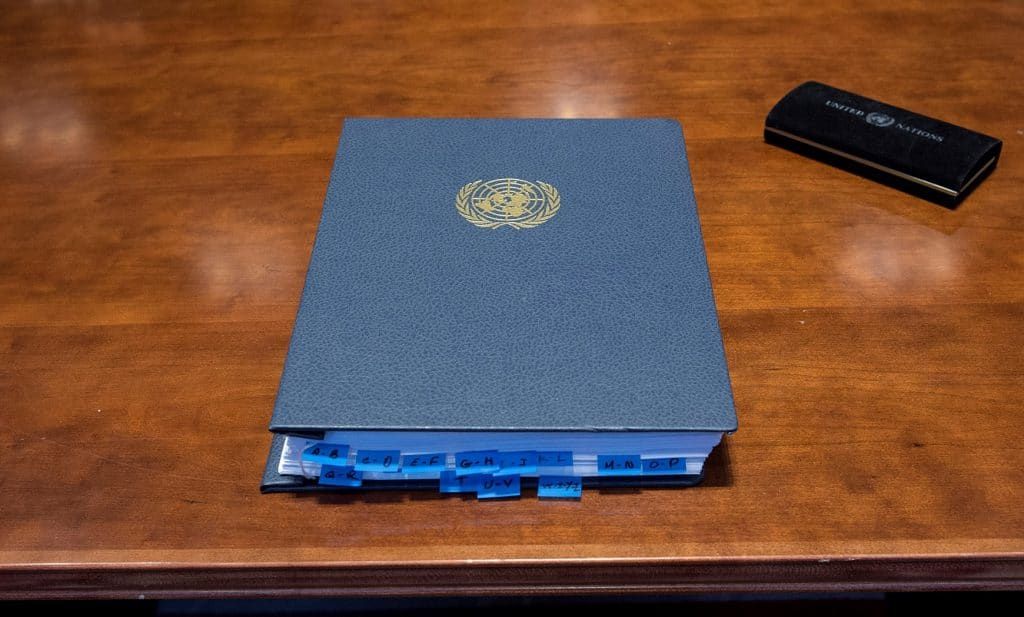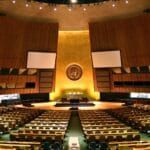The responsibility to disarm and the nuclear ban treaty
By Ramesh Thakur | January 22, 2021
 The book of signatures at the signing ceremony for the Treaty on the Prohibition of Nuclear Weapons, September 20, 2017. UN Photo/Kim Haughton.
The book of signatures at the signing ceremony for the Treaty on the Prohibition of Nuclear Weapons, September 20, 2017. UN Photo/Kim Haughton.
In 1984, President Ronald Reagan noted the nuclear emperor had no clothes: “The only value in our two nations (the United States and Soviet Union) possessing nuclear weapons is to make sure they will never be used. But then would it not be better to do away with them entirely?” Indeed it would. The Treaty on the Prohibition of Nuclear Weapons (TPNW) tries to do so through a new normative settling point on the ethics, legality, and legitimacy of the bomb.
The TPNW enters into force on January 22, 90 days after the 50th ratification by Honduras and three-and-a-half years after adoption by the United Nations General Assembly. Shortly before the 50th ratification—which triggered the countdown to entry into force of the first legally binding treaty to comprehensively prohibit possession, use, deployment, and testing of nuclear weapons—the Associated Press obtained a copy of a US letter to treaty states parties. Washington described the treaty as “dangerous” for the continued viability of the Nuclear Non-Proliferation Treaty (NPT) as the cornerstone of global non-proliferation efforts, said signatories had made “a strategic error,” and called on them to rescind their ratification.
The letter recognized “the sovereign right” of the countries that were party to the NPT to accede to the nuclear ban treaty. In my view it’s also their sovereign responsibility. According to Article 6 of the NPT, nuclear disarmament is the responsibility of every state party, not just the five nuclear weapon states that belong to the treaty: “Each of the Parties to the Treaty undertakes to pursue negotiations in good faith on effective measures relating to cessation of the nuclear arms race at an early date and to nuclear disarmament.” In the famous Advisory Opinion delivered on July 8, 1996, the World Court unanimously strengthened the nature of disarmament obligations under Article 6 from a commitment to pursue negotiations, into an obligation “to pursue in good faith and bring to a conclusion” such negotiations.
In the 50 years that the NPT has been in operation since entry into force in 1970, the countries with nuclear weapons have in practice brought about a redefinition of Article 6. The five nuclear weapons countries quietly transitioned from claiming that the NPT permitted them to possess and deploy nuclear weapons, to behaving as though the NPT entitled them to possess the bomb in perpetuity, thereby legitimizing their monopoly status indefinitely. A good example of this “nuclear weapons states with attitude” syndrome is the derision on open display when, in a speech in London on February 11, the Trump administration’s top arms control official Chris Ford belittled the arms control community as naive virtue-signallers.
Given this reality, what’s a responsible sovereign NPT state party to do? One option is to exit the NPT, as indeed has been suggested by political scientists Tom Doyle, Joelien Pretorius, and Tom Sauer. Any such mass movement by non-nuclear weapon states would certainly kill off the NPT. Instead those countries have chosen to make one last stand to complete the NPT Article 6 agenda on nuclear disarmament by means of a supplementary and reinforcing treaty.
To grasp the argument for the ban treaty as an expression of sovereign responsibility by parties to the NPT, it’s helpful to refer to the Responsibility to Protect principle adopted unanimously at the World Summit at UN headquarters in 2005. This was the largest gathering of world leaders until then. The Responsibility to Protect was formulated and adopted as a replacement for the widely criticized “humanitarian intervention” construct used to justify the Kosovo war in 1999.
Some of the key distinctions between the old humanitarian intervention and the new Responsibility to Protect are relevant to the NPT-TPNW differences.
With humanitarian intervention, the major powers asserted a right to intervene inside the sovereign borders of other states alleged to be engaged in committing humanitarian atrocities, but without any corresponding obligations or restrictions with respect to who made the decision to intervene, the extent and types of force that could be employed, the duration of the intervention, and what they could and could not do as intervening powers. By contrast the Responsibility to Protect requires Security Council authorization for any international intervention for human protection and imposes the new normative framework on all states.
With the NPT, the nuclear-weapons countries have similarly asserted their right, as the five permanent members of the UN Security Council (P5), to enforce non-proliferation obligations on all non-nuclear-weapons states. In 1998 they even levied sanctions on India and Pakistan, which had never signed the NPT, because they had allegedly violated the global norm against nuclear proliferation with their nuclear tests. But the P5 countries have steadfastly rejected any binding obligations under Article 6 to begin and complete their own nuclear disarmament. The Treaty on the Prohibition of Nuclear Weapon moves beyond the Non-Proliferation Treaty in imposing legally binding requirements to disarm and cease and desist from all nuclear-weapon-related activities on all states parties.
Again, the reasoning behind the TPNW is remarkably analogous to the Responsibility to Protect rationale. Every state party has a legal duty and all states have a moral responsibility to promote nuclear disarmament. After 50 years of NPT operation, the nuclear weapons states have manifestly failed to acquit their responsibility to disarm. Their insistence that nuclear disarmament is a matter solely for them in negotiations with one another, and that others have neither voice nor vote on it, is akin to the major powers asserting a right to unilateral intervention with no regulatory role for the UN. Moreover, a nuclear war would be an atrocity on an unimaginable mass scale. No state individually, nor the international system collectively, has the capacity to cope with the humanitarian consequences of such a catastrophic event.
Consequently, as part of its responsibility to protect all life and lives, the international community, acting through the UN, is fully justified in adopting a new treaty to ban nuclear weapons and associated activities. In the language of the humanitarian consequences initiative that led to the TPNW, it is in the interests of the very survival of humanity that nuclear weapons are never used again, and the only guarantee of non-use is no possession—by anyone. Of course, the Ban Treaty cannot impose legal obligations on non-parties, including all nine bomb-possessing states and their allies sheltering under the nuclear umbrella. But it will reorder the envelope of humanitarian laws, norms, practices, and discourse on nuclear weapons.
The ban treaty could have one other unintended but significant consequence. While the P5-controlled Security Council is the geopolitical cockpit of world order, the General Assembly is the normative centre of gravity, owing to universal membership. In practice this translates into a norm and standard-setting division of responsibility for the General Assembly and enforcement role for the Security Council. Once the international community has successfully stigmatized nuclear-weapon possessors, how can the P5 continue to function as the enforcement authority on nuclear issues? As there is no other body that can lawfully and legitimately substitute for the Security Council on this function, what will fill the enforcement gap with regards to nuclear threats to international peace and security?
Together, we make the world safer.
The Bulletin elevates expert voices above the noise. But as an independent nonprofit organization, our operations depend on the support of readers like you. Help us continue to deliver quality journalism that holds leaders accountable. Your support of our work at any level is important. In return, we promise our coverage will be understandable, influential, vigilant, solution-oriented, and fair-minded. Together we can make a difference.















